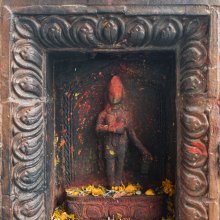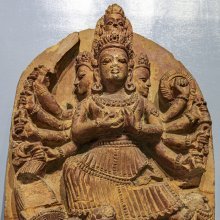Brahmacarini, Brahmacāriṇī, Brahman-carini: 7 definitions
Introduction:
Brahmacarini means something in Hinduism, Sanskrit, Hindi. If you want to know the exact meaning, history, etymology or English translation of this term then check out the descriptions on this page. Add your comment or reference to a book if you want to contribute to this summary article.
Alternative spellings of this word include Brahmacharini.
Images (photo gallery)
In Hinduism
Purana and Itihasa (epic history)
Source: archive.org: Nilamata Purana: a cultural and literary studyBrahmacāriṇī (ब्रह्मचारिणी) is the name of a Goddess that was once worshipped in ancient Kashmir (Kaśmīra) as mentioned in the Nīlamatapurāṇa.—These Goddesses (e.g., Brahmacāriṇī) form the shining galaxy of female deities worshipped by the people of Kaśmīra.

The Purana (पुराण, purāṇas) refers to Sanskrit literature preserving ancient India’s vast cultural history, including historical legends, religious ceremonies, various arts and sciences. The eighteen mahapuranas total over 400,000 shlokas (metrical couplets) and date to at least several centuries BCE.
Shaktism (Shakta philosophy)
Source: Google Books: ManthanabhairavatantramBrahmacāriṇī (ब्रह्मचारिणी) refers to “she who is celibate”.—[...] Kubjikā is said to be naked occasionally in the texts but she is not commonly visualized naked. Perhaps we should associate this form with the naked, celibate (brahmacāriṇī) goddess Mitranātha, the founder of the Transmission of the Child, sees sitting in a fire performing austerities. According to the Kularatnoddyota this is how the goddess appears prior to her entry into the Liṅga. And, it seems, that according to the myth of her origin recounted in the Kubjikāmatatantra, she is naked when she emerges out of it.
Source: Hare-Krsna: Nava-DurgāBrahmacāriṇī (ब्रह्मचारिणी) refers to one of the nine Navadurgā which literally means the “nine forms of Goddess Durgā”, and constitute, according to Vedic scriptures, the manifestation of Durgā in Her nine different aspects. [...] Each goddess [viz., Brahmacāriṇī] has a different form and a special significance.

Shakta (शाक्त, śākta) or Shaktism (śāktism) represents a tradition of Hinduism where the Goddess (Devi) is revered and worshipped. Shakta literature includes a range of scriptures, including various Agamas and Tantras, although its roots may be traced back to the Vedas.
Languages of India and abroad
Sanskrit dictionary
Source: DDSA: The practical Sanskrit-English dictionaryBrahmacāriṇī (ब्रह्मचारिणी).—
1) an epithet of Durgā.
2) a woman who observes the vow of chastity.
Brahmacāriṇī is a Sanskrit compound consisting of the terms brahman and cāriṇī (चारिणी).
Source: Cologne Digital Sanskrit Dictionaries: Monier-Williams Sanskrit-English Dictionary1) Brahmacāriṇī (ब्रह्मचारिणी):—[=brahma-cāriṇī] [from brahma-cārin > brahma > brahman] f. Name of Durgā, [DevīP.]
2) [v.s. ...] a woman who observes the vow of chastity, [Horace H. Wilson]
3) [v.s. ...] Clerodendrum Siphonantus, [cf. Lexicographers, esp. such as amarasiṃha, halāyudha, hemacandra, etc.] ([varia lectio] raṇī)
4) [v.s. ...] Thespesia Populneoides, [cf. Lexicographers, esp. such as amarasiṃha, halāyudha, hemacandra, etc.]
5) [v.s. ...] = karuṇī, [cf. Lexicographers, esp. such as amarasiṃha, halāyudha, hemacandra, etc.]
Sanskrit, also spelled संस्कृतम् (saṃskṛtam), is an ancient language of India commonly seen as the grandmother of the Indo-European language family (even English!). Closely allied with Prakrit and Pali, Sanskrit is more exhaustive in both grammar and terms and has the most extensive collection of literature in the world, greatly surpassing its sister-languages Greek and Latin.
Hindi dictionary
Source: DDSA: A practical Hindi-English dictionaryBrahmācāriṇī (ब्रह्माचारिणी):—(nf) feminine form of '[brahmacārī]'.
...
Kannada-English dictionary
Source: Alar: Kannada-English corpusBrahmacāriṇi (ಬ್ರಹ್ಮಚಾರಿಣಿ):—
1) [noun] an unmarried man or a man under a vow to remain unmarried.
2) [noun] (fem.) one who abstains from sexual intercourse.
3) [noun] the Goddess Durga.
Kannada is a Dravidian language (as opposed to the Indo-European language family) mainly spoken in the southwestern region of India.
See also (Relevant definitions)
Partial matches: Brahman, Carini, Brahma.
Ends with: Ajivabrahmacarini, Bala-brahmacarini, Kaumarabrahmacarini, Naishthikabrahmacarini, Paramabrahmacarini.
Full-text: Paramabrahmacarini, Navagraha, Navadurga, Varnin, Lavanyamanjari, Naishthika, Rupavati, Brahmacarin, Karuna, Kaumara.
Relevant text
Search found 11 books and stories containing Brahmacarini, Brahmacāriṇī, Brahman-carini, Brahman-cāriṇī, Brahma-carini, Brahma-cāriṇī, Brahmācāriṇī, Brahmacāriṇi; (plurals include: Brahmacarinis, Brahmacāriṇīs, carinis, cāriṇīs, Brahmācāriṇīs, Brahmacāriṇis). You can also click to the full overview containing English textual excerpts. Below are direct links for the most relevant articles:
Manusmriti with the Commentary of Medhatithi (by Ganganatha Jha)
Verse 5.156 < [Section XIV - Duties of Women]
Ramayana of Valmiki (by Hari Prasad Shastri)
Chapter 33 - King Kushanabha’s hundred daughters < [Book 1 - Bala-kanda]
Baudhayana Dharmasutra (by Georg Bühler)
The Shiva Purana (by J. L. Shastri)
Chapter 33 - The March of Vīrabhadra < [Section 2.2 - Rudra-saṃhitā (2): Satī-khaṇḍa]
Prasthanatrayi Swaminarayan Bhashyam (Study) (by Sadhu Gyanananddas)
1.3. Pramāṇas: Basic Introduction < [Chapter 2 - Analysis on the Basis Of Epistemology]
Related products


